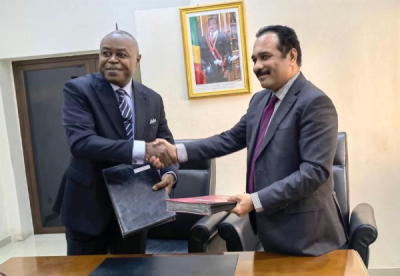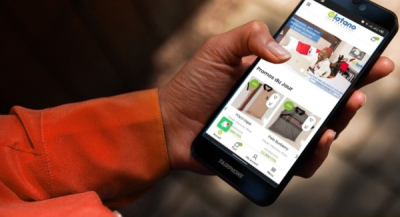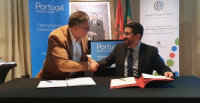By paying €15 daily, cab drivers can become owners within 48 to 60 months.
Cmontaxi is a digital solution developed by a Senegalese eponymous startup, founded in 2015. It allows cab drivers to become car owners within a given time frame.
"With an average monthly salary of €600, cab drivers] don’t earn enough to be able to access traditional bank loans or the car manufacturers’ leasing packages,” says Aziz Senni, founder and CEO of Cmontaxi.
The package set up by Cmontaxi includes lease-purchase, maintenance, and insurance agreements. Drivers have to pay €15 daily and become owners within 48 and 60 months. The amount is about 10% lower than the price drivers have to pay for other lease-purchase agreements. This is probably why the startup also uses the cabs as advertising media.
Its stated goal is to improve its drivers’ living standards by making transforming them into entrepreneurs, not just cab drivers. "I decided to allow these drivers to become cab owners without upfront payment, give them micro-business management training and help them reduce their insurance and maintenance costs,” Aziz Senni explains.
With its booking platform, the startup allows its drivers to boost their revenues. Cmontaxi also set up "Taxishop", a concept that allows drivers to increase their revenues by offering additional products and services on board their taxis.
Adoni Conrad Quenum
She is one of the leading women in the African cybersecurity industry. Through CyberSafe Foundation, she raises awareness on how to stay cyber-safe. For her impact on the continent, she has already received several awards and recognitions.
Confidence Staveley (photo) is a Nigerian cybersecurity expert. She graduated from Middlesex University, in 2011, with a BSc in information technology and Business information systems. In 2013, she got a Master’s in IT management from the University of Bradford.
In 2019, she founded Cybersafe Foundation, an NGO that raises promotes changes (through awareness campaigns and training) for a safer internet for African users.
Recently, through the #NoGoFallMaga initiative, the organization launched cybersecurity awareness campaigns that reached over 20 million people. It also organized cybersecurity training reaching more than 4,000 small and medium-sized businesses and over 9,000 employees. The NGO also launched the first cybersecurity awareness handbook in Africa.
“We were looking at really innovative ways to drive awareness about cybersecurity and making people see the importance in the first place and how it applies to them as individuals. And helping them take actionable steps to become safer online, but we’re doing it in a way that’s not overwhelming,” Confidence Staveley said in June 2022, explaining the reasons behind the campaign.
Since August 2022, the cybersecurity expert, who calls herself a “cyber evangelist”, is a member of the Forbes Technology Council. She entered the professional world, in 2009, as a computer instructor at Eastern Data Services Ltd. In 2011, she was hired as an IT Assistant by the Cross River State Government.
She later joined Lloyds Banking Group as a customer service advisor and telephone banking consultant. In 2013, she joined the Calabar International Convention Centre as an IT specialist and, two years later, she landed at InfoGraphics Nigeria, where she was appointed technical marketing and interactive media manager.
Between 2016 and 2018, she was a cybersecurity analyst for UIC Innovations Africa. A year later, she became the country manager of the computer security firm DIGISS. Concurrently, from 2017 to 2022, she worked as a part-time managing partner of the marketing firm Gidinerd.
Ms. Staveley is a multiple award winner. She has been cited on CIO Magazine’s 2021-2022 list of Africa’s 45 most influential women in Digital Transformation. the Cyber Security Expert Association of Nigeria (CSEAN) also named her the 2022 Cyber Security Woman of the Year and she received the Meridian Global Leadership Award at the Global Leadership Summit for her positive impacts. This year, she also made it to the list of the top 100 Most Inspiring Women in Nigeria and received the Obama Leader's Personal Commitment Award.
Melchior Koba
Congo plans to considerably advance its digital projects in 2023. For that purpose, it is multiplying partnerships and agreements with specialized companies.
Last Tuesday, Congolese Digital Minister Leon Juste Ibombo (photo, left), signed a memorandum of understanding with Sivakumaran Kathiresan (photo, right), the vice president of ATDXT, an Indian company specializing in digital transformation.
The memorandum between Congo and the Dubai-based company aims to support the country in the implementation of several projects, including the most important which is the digitization of the Post and Savings Company of Congo (Sopéco).
According to Sivakumaran Kathiresan, the memorandum aims to enable the construction of digital infrastructure and contribute to the digitalization of the Congolese economy.
“We will build data centers, finance the digitization of the Sopéco, promote the revival of its activities and proceed to the design of single windows in Congo,” he said.
The memorandum adds to the other agreements and partnerships already signed by Congo for its digital transformation this year. The country has teamed up with several partners to build choice digital infrastructure and build resilience. In November, the Digital Minister signed an agreement with Canadian company Casimir Network to train local talents in innovative technologies and build and operate a datacenter that will host the servers of the country's blockchain services.
With ATDXT, which is also established in Great Britain, the United States of America, India, and the Democratic Republic of Congo, Congo aims to take advantage of Indian expertise to implement its digital development policy and achieve the objectives of the digital strategy "Digital Congo 2025".
Samira Njoya
In Africa, the ecommerce industry is booming. According to the IFC, the number of online shoppers on the continent has risen by 18 percent since 2014. This growth, fueled notably by the coronavirus pandemic, could continue over the next decade.
Last Wednesday, Gabonese ecommerce platform Olatono Market, announced it raised €45,000 to accelerate its expansion in Central Africa, strengthen partnerships and create a platform that revolutionizes ecommerce in Gabon.
"Our innovative platform differs from the existing offers. It is launched to meet the expectations of customers who are increasingly searching for solutions that give them command over their choices, enable them to compare prices and access products wherever they are in Gabon,” said Thierry Dzime, founder of Olatano Market.
The platform created in March 2021 wants to transform the ecommerce industry in Central Africa. It developed a service called Achat Flex, allowing individuals to purchase products online and pay on delivery, by installments, by mobile money, or by bank cards. It was a first in Gabon where ecommerce was gradually gaining ground.
Thanks to the funds secured, Olatano Market's managers want to develop even more services, accelerate the start-up's growth, strengthen its workforce and sign new agreements. "We are delighted to support the expansion of the company and the launch of the new product Achat Flex. The ambition is to help the future champions of Gabon’s economy emerge. We are pleased to have made these investments in a start-up with great potential. We will support its progress," said Fabrice Nze-Bekale, President of Gabon Angel Investor Network (GAIN).
According to a report by the GSMA and the Economic Commission for Africa (ECA), Gabon became the e-commerce leader in the ECCAS (Economic Community of Central African States) zone in 2021, overtaking Cameroon.
Samira Njoya
In the growing music streaming market, giants like Apple Music, Spotify, and Deezer have captured the bulk of the demand. Nevertheless, African platforms are gradually poking the market by focusing on local content.
Mdundo is a digital platform developed by a Kenyan eponymous startup. It allows users to legally download and stream African songs.
According to its co-founder and CEO Martin Nielsen, the platform currently has some five million monthly users but, its potential is 30-fold higher. “With a steep growth curve and a very scalable solution, we plan to invest further in user growth to increase our market coverage in sub-Saharan Africa and within approximately three years establish Mdundo as the leading Pan-African music service for consumers and musicians. We want to achieve in Africa what Spotify has achieved in the West and what Tencent has achieved in Asia.,” he explains.
To achieve its growth targets, the startup, which claims to be the leader in the pan-African music market, has already raised more than US$6.4 million.
Apart from a web platform, its solution has an Android app, through which users can sign up for streaming services. Currently, the services are available in more than 15 countries in Sub-Saharan Africa. Its Android app has been downloaded more than a million times while the startup claims over 20 million monthly music downloads and streaming through its web and mobile apps.
After her computer science studies, she specialized in the agribusiness industry by helping rural women. Her social contribution and tech impact earned her several awards and recognitions.
Awa Caba (photo) is a Senegalese computer scientist and the co-founder/CEO of the e-commerce platform Soreetul.
In Wolof -the most-spoken language in Senegal, Soreetul means “it is no longer far” according to a dissertation by Senegalese Dphil Layire Diop. The digital platform created by Awa Caba facilitates the marketing and distribution of agricultural products processed by women in Senegal. Founded in 2013 -2014 according to other sources, it connects rural farmers, women notably, with buyers in urban areas.
In 2015, explaining what prompted her to launch Soreetul, Awa indicated that it was founded because the co-founders noticed that local products were seldom found in large stores or neighboring shops while women who process such products had no access to markets because they live in remote areas.
Apart from Soreetul, Awa Caba has also co-founded Yeesal Agri Hub, an innovative entrepreneurship support institution specializing in agribusiness. In December 2022, the institution founded in 2016, was selected to be part of the Rural Impacting Entrepreneurship program developed by Small Foundation and Village Capital.
She also co-founded Jiggen Tech Hub, the first women-in-tech network in Senegal. Since 2013, she is the Co-founder and IT manager of the web and mobile app development startup Weltima. Her professional career began in 2012 as an IT engineer at Nelam Services. She worked as a consultant for International Fund for Agricultural Development in 2014, USAID-ERA (Education and Research in Agriculture) project from June to August 2017, and FAO from February to December 2017.
The Mandela Washington Fellow has received several awards and honors. In 2020, she won the African Women's Leadership Award. In 2018, she won the Bank of Africa's African Entrepreneurship Award. She was also cited by “Forbes Africa as one of the most promising entrepreneurs under the age of 30 in Africa.”
Melchior Koba
The program aims to finance the development of African tech ecosystems.
Last Tuesday, Digital Africa announced its first 15 “Connectors" (leaders who will collaborate with Digital Africa for the development of local and regional tech and entrepreneurial ecosystems).
In a release accessed by We Are Tech Africa, Digital Africa explains that the 15 leaders will help find customized solutions to community challenges and generate effective opportunities. “Africa needs African-designed solutions to the continent's structural and infrastructural problems, be it in health, sports, energy, agriculture and we believe that it is in the made-in-Africa tech that can do it,” explains Aphrodice Mutangana, director of partnerships at Digital Africa.
A few months ago, Digital Africa launched a call for applications for its "Connectors Digital Africa" program. At the end of the selections, fifteen high-level African personalities were chosen, with three connectors per region: North Africa, South Africa, West Africa, East Africa, and Central Africa. They were selected based on their professional experience, and their strong sense of leadership, but especially for their commitment to having a positive impact on the African tech ecosystem.
Their missions will include acting as ambassadors representing Digital Africa in the region and providing a link between their community and Digital Africa, organizing activities and events on behalf of Digital Africa, identifying and mobilizing resources, and helping to map the ecosystem and suggest solutions.
"Connectors" is one of several initiatives launched by Digital Africa since its inception in 2018. In October, the pan-African initiative launched "Fuzé", a program that aims to provide a solution to the financing problems faced by African startups.
Samira Njoya
The solution is the successor of the proprietary solution AppZone. Its stated mission is "to connect every monetary store of value using blockchain."
Zone is a fintech solution developed by the Nigerian start-up Appzone Group. As the successor of the startup’s fintech solution Appzone, it “allows participating institutions to connect directly with each other and perform payment transactions without an intermediary while completely automating settlement, reconciliation, and dispute management.”
The solution is a regulated Blockchain network that enables payments and acceptance of digital currencies. According to the startup, its Layer-1 blockchain network guarantees 100% transaction success for payments made in fiat currency or digital currencies. In addition, it guarantees frictionless transactions and universal interoperability. As the platform says, "the network ensures that end-users interact in an easy and natural way and that service providers don’t need to make any extra effort to support payment functionality."
Zone also “supports integration to all systems that store monetary value and all touchpoints used to initiate payments.” To make the system more efficient, it provides simple and effective programming interfaces that can be used multiple times for different payment transactions.
In early 2021, to support the expansion of its technology, AppZone raised US$10 million in Series A financing. “As Appzone, we launched the first core banking and omnichannel software on the cloud as well as the first multi-bank direct debit service based on single global mandates. With this transition to Zone, we are utilizing the power of blockchain technology to connect every monetary store of value and enable reliable, frictionless, and universally interoperable payments,” says Obi Emeratom (photo, center), Co-founder and CEO of AppZone.
Adoni Conrad Quenum
He began his career providing tech assistance for educational projects and programs. For over 10 years, through BongoHive, he has worked with entrepreneurs and development partners to foster youth entrepreneurship.
Lukonga Lindunda (photo) is a Zambian start-up ecosystem builder and the co-founder/CEO of BongoHive Technology and Innovation Hub, Zambia’s first tech innovation center.
Thanks to the innovation hub, he supports the startup ecosystem by improving leadership skills, accelerating their growth, strengthening networks, increasing collaboration, providing a forum for the exchange of ideas, and reducing barriers to entrepreneurship.
Since its inception, BongoHive has hosted over 500 events, supported over 2,000 businesses, and benefited more than 9,500 people. In December 2022, it was selected to participate in Small Foundation and Village Capital’s Rural Impacting Entrepreneurship research project.
In 2015, its CEO and co-founder also co-founded BongoHive Consult, a consulting firm that helps businesses meet their clients’ current and future needs. In 2019, he also co-founded Hive Coworking, which provides coworking space for entrepreneurs and startups.
Since 2021, he is a non-executive director of the fintech company Digital Shared Services Ltd. Months earlier, he became the chairperson of the non-profit financial organization FSD Zambia’s Program Investment Committee (PIC). Since June 2020, he is also the non-executive director and vice chairman of Client Care Solutions Limited, a business process outsourcing company.
The serial entrepreneur entered the professional world in 2008 working for the non-profit organization Education Development Center as an IT and communication coordinator. The following year, he became the ICT technical assistant of the non-profit organization VVOB - education for development.
From 2010 to 2012, he was successively Junior ICT Advisor and ICT Program Advisor of VVOB. Between March 2021 and August 2022, he was an independent advisor to the Technology, Service Delivery, and Innovation Committee of the Zambia National Commercial Bank (Zanaco) Board of Directors.
A Mandela Washington Fellow in 2014, Lukonga Lindunda received the Nelson Mandela University Alumni Award in 2017 for his impact on society with BongoHive. In 2020, he received the ALUSB MBA Chairman's Scholarship, which celebrates African business leaders who have proven themselves as leaders both in the workplace and in the community.
Melchior Koba
In recent years, Morocco has built a number of partnerships to develop its digital sector. Last October, the government announced international partnerships that would help create more than 14,000 direct digital jobs in the country.
On December 6-9, 2022, Morocco hosted a mission of Portuguese tech entrepreneurs in partnership with several digital actors, namely the Agency for Investment and Foreign Trade of Portugal (AICEP Portugal Global), the National Association of Young Entrepreneurs (ANJE), the Confederation of Enterprises of Portugal (CIP) and the Association of Companies for a Network of Innovation of Aveiro (INOVA-RIA).
The mission aimed to present the current potential of the Portuguese technology ecosystem, identify business opportunities and establish partnerships with Moroccan tech companies.
During the 4-day visit, participants took part in B2B meetings in Casablanca. In Rabat, they also participated in a forum with the Moroccan public administration and local entities that have digital projects. Through that visit, the Portuguese tech entrepreneurs wanted to present themselves as privileged partners in the Moroccan ICGT industry and consolidate the relationship between the two countries’ digital actors.
Portugal is among the most business-friendly, stable, and open countries in the European Union in terms of innovation, digitization, and technical expertise. It is currently the 7th most advanced country in Europe according to the "Digitization in Europe 2020-2021" report. According to the World Economic Forum's Global Competitiveness Report 2020, it is the 6th best-prepared country in the world for the energy and digital transition, enabling a greener and more inclusive economy.
Thanks to the envisaged partnerships, Morocco will be able to take advantage of Portugal’s skills and experience to effectively implement the numerous projects planned in its digital strategy. In the Maghreb, Morocco is one of the pioneers of digital transformation. In 2005, the country started implementing digital strategies, including the "e-Morocco 2010" strategy, followed by the "Digital Morocco 2013" plan, "Digital Morocco 2020" and "Horizon 2025". In 2020, it was ranked fourth in the MENA "Digital Risers" (ranking of countries in terms of digital competitiveness).
Samira Njoya
More...
Changing processes, management procedures, and interfaces called for by the ongoing digital transformation require investments, which most small businesses can not afford. The partnership aims to help in that regard and support small businesses through various means.
Pan-African fintech MFS Africa and the International Trade Centre (ITC) recently signed a partnership agreement to accelerate the digitalization of African markets.
According to a release issued by the ITC last Friday, the two “entities will support businesses in more than 10 African markets (Benin, Côte d’Ivoire, Ethiopia, Ghana, Mali, Rwanda, Senegal, Uganda, Tanzania, Zambia) through product integration, capacity building in fintech and digital payments, exposure to investment and business-to-business meetings.”
“With this partnership, ITC will strengthen its commitment to support small businesses in accessing financing and in digitalization and jointly tackle SDG 8 (Decent Work and Economic Growth). This partnership is the next step into ITC’s ambition to collaborate with the private sector to scale solutions supporting small business,” said Robert Skidmore, Chief of Sector and Enterprise Competitiveness at the International Trade Centre.
According to the LSEG Africa Advisory Group's 2018 report, "The challenges and opportunities of SME financing in Africa," SMEs are crucial for job creation and economic growth in Africa. In Africa, they account for about 90 percent of established businesses, create between 60 percent and 80 percent of jobs, and contribute 40 percent of GDP. In comparison, SMEs in the United States and Europe represent 53% and 65% of established businesses respectively.
Through this partnership, ITC and MFS Africa will help put small businesses at the heart of financial inclusion and digitalization. The partnership marks an important step in contributing to the United Nations 2030 Agenda for Sustainable Development. It will "build a new era where small business is at the heart of economic growth for the benefit of millions of African citizens," according to Ali Ouedraogo, head of expansion at MFS Africa.
Samira Njoya
The solution capitalizes on the free-movement-agreement between West African countries to easily move goods across the sub-region, facilitating transport and logistics operations for whosoever needs such services.
Anaxar is a digital platform developed by a Togolese eponymous start-up, founded in 2020. It helps users easily transport goods across West Africa. In fact, it connects freight owners, truck owners, and freight recipients.
Using its platform, users can request free quotes by filling out a dedicated form and providing information such as the nature of the goods, the weight, and the departure and arrival areas. Once the form is submitted, the startup gets in touch to evaluate needs and provide personalized and the most competitive quotes. When the user accepts the quote, he/she needs to validate it to get the goods transported to the desired location.
Let’s note that once the goods arrive at the stated location, the startup once again contacts the user to notify it. Apart from transporting goods, Anaxar also specializes in removal and delivery. It is present in all the West African countries with a network of over 1,000 professional transporters. It claims competitive prices and points out that its priority is customer satisfaction, with the goal of becoming the leader in the sector.
Adoni Conrad Quenum
Through Snode Technologies, the experienced cybersecurity consultant has developed several cybersecurity tools, receiving international honors and awards.
Nithen Naidoo (photo) is a South African computer scientist who graduated from the University of Pretoria in 2002. He is the founder and CEO of computer security and networking company Snode Technologies, based in Johannesburg, South Africa.
Snode Technologies -founded in 2016- is a cloud-based cybersecurity platform. Its algorithms process dynamic data -audio, video, and text- in real-time to help analysts identify behavioral trends, anomalies, and patterns that were previously impossible to identify with the naked eye.
“Snode was created to gain insight into prevailing patterns, not visible to the human eye, allowing our users to identify attacks before they happen,” Nithen Naidoo said in 2021.
The said startup has more than 80 points of presence worldwide. It offers three services, namely Snode Guard, Snode Guardian, and Snode Panthera.
Snode Guard provides automatic protection against threats such as malware, ransomware, phishing, and disinformation. Snode Guardian provides valuable information about cybersecurity risks or threats that may be prevalent in a said environment to prevent cyberattacks. Meanwhile, Snode Panthera disables attacks and defends vulnerable systems with its real-time automated response system.
Its founder is the winner of the 2019 MEST Africa Challenge. He is also the winner of the SA Innovation Summit 2020, the national finalist of the 2020 Entrepreneurship World Cup, and a finalist of the 2020 Pitch Live competition organized by Disrupt Africa and Africa Tech Summit. In 2021, he received the AfricArena Emerging Entrepreneur Award. His cybersecurity firm was selected among Slingshot 2020’s top 100 global deep tech startups. It was also a finalist for the AppsAfrica 2020 Innovation Award.
The honors and awards crown a professional career that started in 2003 when he joined Orange Cyberdefense as a penetration tester. From 2005 to 2007, he was a senior security consultant for Deloitte. In 2007, he joined the financial services firm Investec as a senior security analyst. Then, in 2009, Absa Group hired him as a senior security architect.
Melchior Koba
Information and communication technologies have proven their worth in improving efficiency and facilitating growth in various sectors. For that purpose, in a bid to leverage their power, Cameroon wants to up its investments in the sector.
Last Tuesday, Cameroonian President Paul Biya (photo) signed a decree empowering the Minister of Economy to ink a EUR84.1 million loan agreement with the International Development Association (IDA). The funds thus secured aim to finance PATNuC, a project to accelerate digital transformation in the country.
According to the Ministry of Posts and Telecommunications (Minpostel), the project being implemented since 2021 aims to pursue ICT reforms and policies, improve citizens’ digital skills, encourage the development of digital apps and services and increase the reach and use of digital services to boost employment and entrepreneurship in Cameroon.
PATNuC has three main companies. The first is the establishment of new institutional, legal and regulatory frameworks conducive to the growth of the digital sector, the enhancement of digital trust, the creation of digital platforms, and the acquisition of relevant equipment for the secure and resilient development of digital services in Cameroon.
The second component focuses on stimulating the local market by facilitating Internet access and the inclusive use of ICTs for the development of the country’s economic fabric. "Its specific objective is to promote the expansion of digital networks in rural areas by focusing on underserved areas to improve mobile broadband services in those areas. It will do so mainly through public-private partnerships (PPPs)," explains the Ministry of Posts and Telecommunications.
The last component focuses on strengthening disruptive agricultural technologies (DAT) to improve market linkages and value addition in targeted rural communities.
S.A.















